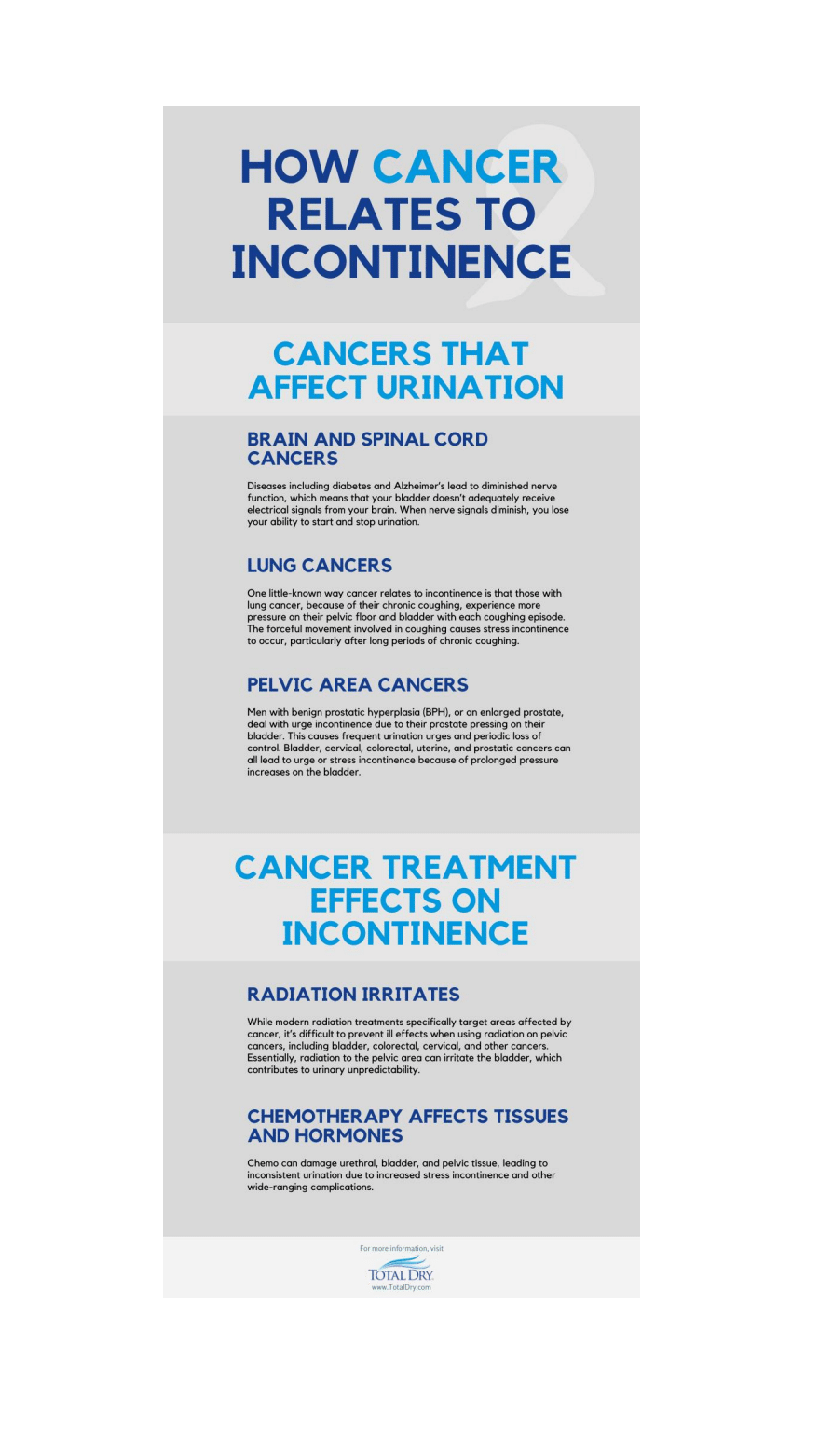
How Cancer Relates to Incontinence
Share
Cancer devastates lives and takes away so many freedoms. It limits people’s mobility, drastically changes their appearance, compromises their immune systems, and irreparably damages their bodies. Though lost hair, swelling, and fatigue are clear characteristics, there are other, more under-the-radar symptoms that many people with cancer experience. One symptom that many people cope with for years without advertising is urinary incontinence. There are countless ways that cancer complications and the corresponding treatments induce incontinence. Read on to discover how cancer relates to incontinence.
Cancers That Affect Urination
Cancer is an all-encompassing disease that affects so many aspects of life. Understandably, one of the many symptoms is incontinence. What’s particularly noteworthy is the bevy of ways that cancer contributes to urinary incontinence, ranging from greater stress incontinence, neurological deterioration, hormonal imbalances, and more.
Brain and Spinal Cord Cancers
Nerve damage or inhibition is a principle factor in incontinence symptoms. Diseases including diabetes and Alzheimer’s lead to diminished nerve function, which means that your bladder doesn’t adequately receive electrical signals from your brain. When nerve signals diminish, you lose your ability to start and stop urination. When you develop brain or spinal cord cancers, the tumors on either area of your body stop nerves from consistently telling your bladder to constrict or relax when you would like it to. Those who suffer from spinal cord cancer may not be able to stop their bladder from leaking. Brain tumor patients may suffer from more than just nerve damage—their potential cognitive dysfunction and seizures increase their risk of an incontinence episode.
Lung Cancers
One little-known way cancer relates to incontinence is that those with lung cancer, because of their chronic coughing, experience more pressure on their pelvic floor and bladder with each coughing episode. The forceful movement involved in coughing causes stress incontinence to occur, particularly after long periods of chronic coughing. This is because repeated pressure to your pelvic muscles weakens them over time. Also, lung cancer comes with the risk that tumors can spread to your spinal cord, which is nearby. While serious for many reasons, this multiplies the factors that play into potential bladder leakage.
Pelvic Area Cancers
Cancers in the pelvic area present physical barriers to healthy urinary function. Men with benign prostatic hyperplasia (BPH), or an enlarged prostate, deal with urge incontinence due to their prostate pressing on their bladder. This causes frequent urination urges and periodic loss of control. Bladder, cervical, colorectal, uterine, and prostatic cancers can all lead to urge or stress incontinence because of prolonged pressure increases on the bladder. Like with any cancer, the threat of tumor spread from the pelvic region could complicate nerve function and further contribute to incontinence.
Cancer Treatment Effects on Incontinence
A common refrain when talking about cancer is that the treatments for it—radiation, chemotherapy, and surgery—often harm the body as they seek to restore it to health. This is true when it comes to incontinence as well.
Radiation Irritates
Radiation therapy uses high-strength radiation to destroy or shrink malignant tumors. While modern radiation treatments specifically target areas affected by cancer, it’s difficult to prevent ill effects when using radiation on pelvic cancers, including bladder, colorectal, cervical, and other cancers. Essentially, radiation to the pelvic area can irritate the bladder, which contributes to urinary unpredictability.
Chemotherapy Affects Tissues and Hormones
Another treatment that impacts incontinence is chemotherapy. Chemotherapy involves anti-cancer medications that kill existing cancerous tumors and prevent these tumors from reproducing. While patients take these drugs to target cancerous cells, the medication affects their entire body. Chemo can damage urethral, bladder, and pelvic tissue, leading to inconsistent urination due to increased stress incontinence and other, wide-ranging complications. Also, vomiting during chemotherapy treatment, like coughing, stresses pelvic muscles and may lead to bladder leakage. Often, cancer patients experience both radiation and chemotherapy, increasing their overall risk of incontinence in the process.
Breast Cancer Treatment
Meanwhile, breast cancer treatment allows for urinary incontinence through a different mechanism. Breast cancer medications aim to decrease specific hormones associated with cancer growth, including estrogen and progesterone. When estrogen lowers, tissue strength lowers and the risk of stress incontinence increases. One common side effect of tamoxifen, a common breast cancer drug, is urethral dryness, which can generally irritate the urinary system and complicate going to the bathroom.
Incontinence After Surgery
Surgical interventions are common for removing existing cancerous tumors. While these surgeries greatly improve patients’ outlook, some surgeries come with built-in risks for bladder issues.
Prostate and Hysterectomy Surgeries
While BPH does present a physical barrier for proper urinary function, surgery to remove the prostate may also have related side-effects. Upon removal, the urethra may not have the structural support to operate effectively. Meanwhile, when women go through a hysterectomy their pelvic floor may weaken. In general, any surgery in the pelvic area risks damaging nearby muscle or nerve tissue that affect urinary control. This can lead to long-term loss of control despite the benefits to overall health.
Steps That Help
While your fight with cancer is difficult enough, there are clear steps you can take to restore control over your urination.
Behavioral Changes
One thing is certain—your urinary routine is vital for limiting your incontinence problems. While people with cancer suffer from complications a routine cannot eliminate, being intentional about when and how you go to the bathroom is important. Scheduling trips to the bathroom once every hour or so and tracking when you go helps you feel more in control over urinating, whereas incontinence diminishes your confidence. Also, limiting water intake before bedtime helps you avoid a nighttime accident. The reason you’ll want to avoid water only at that time is because cutting out too much water overall can irritate your bladder and worsen your symptoms.
Kegel Exercises
Kegel Exercisesegel exercises are universally recommended for all who are able. These exercises involve constricting and relaxing your pelvic muscles routinely like you would any other exercise. You fight muscle loss by doing this and raise your overall confidence.
Incontinence Products
Cancer sometimes limits your mobility, greatly weakens you, and prevents you from taking many steps to limit incontinence. If you find yourself in this position or maintain your mobility and energy and still want help, consider using incontinence products. Incontinence pads provide a reliable backup plan, so even if you have an accident, it doesn’t ruin your day. For more capacity that you can pair with other incontinence products, consider booster pads to manage your incontinence as you fight and recover from cancer.
Booster Pads
Cancer can be an extremely difficult diagnosis to deal with on its own, but it can be even worse when it limits your mobility and weakens your body. However, there are ways to still manage incontinence without having to overexert yourself. Incontinence products such as pads provide a reliable backup plan, so you will always feel confident in the sense of security that you have the option for protection in the event of an accident. Furthermore, booster pads are designed to extend the lifespan of an incontinence garment and make sure that even if you need more support than usual due to your weakened state, these pads provide increased absorbency while ensuring that you remain dry and secure throughout the day.

